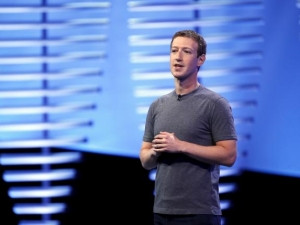
Facebook last night announced the Messenger Platform, which will allow developers to build artificial intelligence-driven chatbots for business.
The company hopes simulating one-on-one conversations between users and companies will expand its reach in customer service and enterprise transactions.
Chatbots are automated programs that help users communicate with businesses and carry out tasks such as restaurant reservations and online orders. They have existed in some form for years, but recently became a hot topic in the tech industry as advances in artificial intelligence (AI) and machine learning make them far more capable.
The chatbots are part of Facebook's effort to establish its Messenger instant messaging app as the go-to place for customers to contact businesses. This strategy threatens traditional call centres but may cut personnel costs for some companies.
"You'll never have to call 1-800-Flowers again," Facebook CEO Mark Zuckerberg said during the company's annual F8 developer conference in San Francisco.
Facebook commands a vast trove of data on the estimated 1.6 billion people who use the main service and the 900 million who use Messenger. This personal information on so many people allows developers to create chatbots that can personalise tasks and follow up.
"Now you'll be able to send messages to a business like you do with a friend ? and get a quick reply without taking your full attention or requiring you to install a new app," said Zuckerberg.
In March, Dutch airline company KLM launched a bot on the service that allows passengers to check-in, get boarding passes and change flight details within the app.

"Businesses have struggled to build relationships at scale on social media," says Mike Wronski, director at Digital Flow. "The new wave of AI-powered chatbots will now allow them to seamlessly serve their customers in a human-like way."
Tech companies will have to approach chatbots carefully, however, after an experimental Microsoft bot, called Tay, unleashed a barrage of racist and sexist tweets after being manipulated by Twitter users last month. The company quickly pulled Tay from the Internet.
"One needs a bit of a reality check on AI and how quickly it is materialising as a genuine substitute for human interaction," says Brian Neilson, director at BMI-TechKnowledge. "Today's AI is still quite basic. But F8 looks at a 10-year view, and 10 years is a long time in this industry, so we will probably be surprised at how sophisticated the AI-based features of many applications will be by then."
End of call centres?
"Initially, chatbots will add automation to some communication and support tasks, and allow quick, easy and immediate answers to standard questions, much like your standard call centre, but with prompt response," says Goldstuck.
Wronski says consumers would rather use Messenger, "a free, real-time communications platform that is built around their needs," than a call centre that may put them on hold for 20 minutes.
However, Neilson says: "Sometimes all you want is to talk to a person who can sort out your problem efficiently.
"Replacing the human with an AI is more akin to ACD [automatic call distributor] and IVR [interactive voice response] call centre functionality, which can easily become one of the most annoying and frustrating interfaces known to man, but even IVR, when it works, does work well and can save time, particularly in highly overloaded call centres.
"AI functionality within the customer service channel could certainly enable a much better experience than old-school ACD/IVR. But, I think there will always be a need for a real live human in the call centre as part of integrated, multi-channel interaction," says Neilson.
Stream from anywhere
Another announcement at F8 was the launch of Live API, the opening of Facebook's new live-broadcasting feature to developers.
A drone whizzed past Zuckerberg on stage as he made this statement. He explained drone company, DJI, was one of the first partners to come on board ? which means live video from drones can now be streamed directly to Facebook.
The company has made a big push in the live-broadcasting space, last week announcing a dedicated hub for it within the mobile app.
"Facebook's prerogative is to predict what consumers will be doing and how they will be sharing it in the future, and live video is one such prediction," says Wronski.
Goldstuck is sceptical about live-broadcasting, saying: "People have to be given a compelling reason to use live streaming, and we have not yet heard that reason."
However, he adds: "There isn't really any competition in this environment. Periscope has made little impact on the world, and most social media users don't know what it is or how to use it."
Decade of connectivity
Zuckerberg laid out the company's 10-year plan in the keynote address, saying it will focus on artificial intelligence, virtual reality and connectivity.
"These areas will all be deeply intertwined," says Goldstuck, "with AI driving AR but heavily dependent on connectivity at first. Over time, AI will be more effectively and efficiently built into devices, but the processing power required for it means that, initially, it will be heavily dependent on processing in the cloud."
Facebook revealed a 3D-360 camera system, Facebook Surround 360, which produces sharp, spherical footage in 3D. The system includes stitching technology that seamlessly marries the video from 17 cameras, reducing post-production effort and time. The company says the design specs and stitching code will be available on GitHub later this year.
The social network is working on allowing users to create 'moving' profile pictures. It has opened a closed beta version of the Profile Expression Kit to developers to create apps and extensions that will allow for this. The kit has support for Boomerang by Instagram, Lollicam, BeautyPlus, Cinemagraph Pro by Flixel, MSQRD and Vine.
Facebook also said Instant Articles is now open to all publishers, of any type, anywhere in the world.
Other announcements included Rights Manager, a tool that helps publishers manage and protect video on Facebook at scale, and an Insights update.
The conference continues today.
Share